The immune health supplement space is getting a major boost with PLT Health Solutions' announcement of their latest clinical study on Spectramune™ Immune Defense Complex.[1] The study provides evidence that this unique botanical blend may help support a stronger, more balanced immune system.
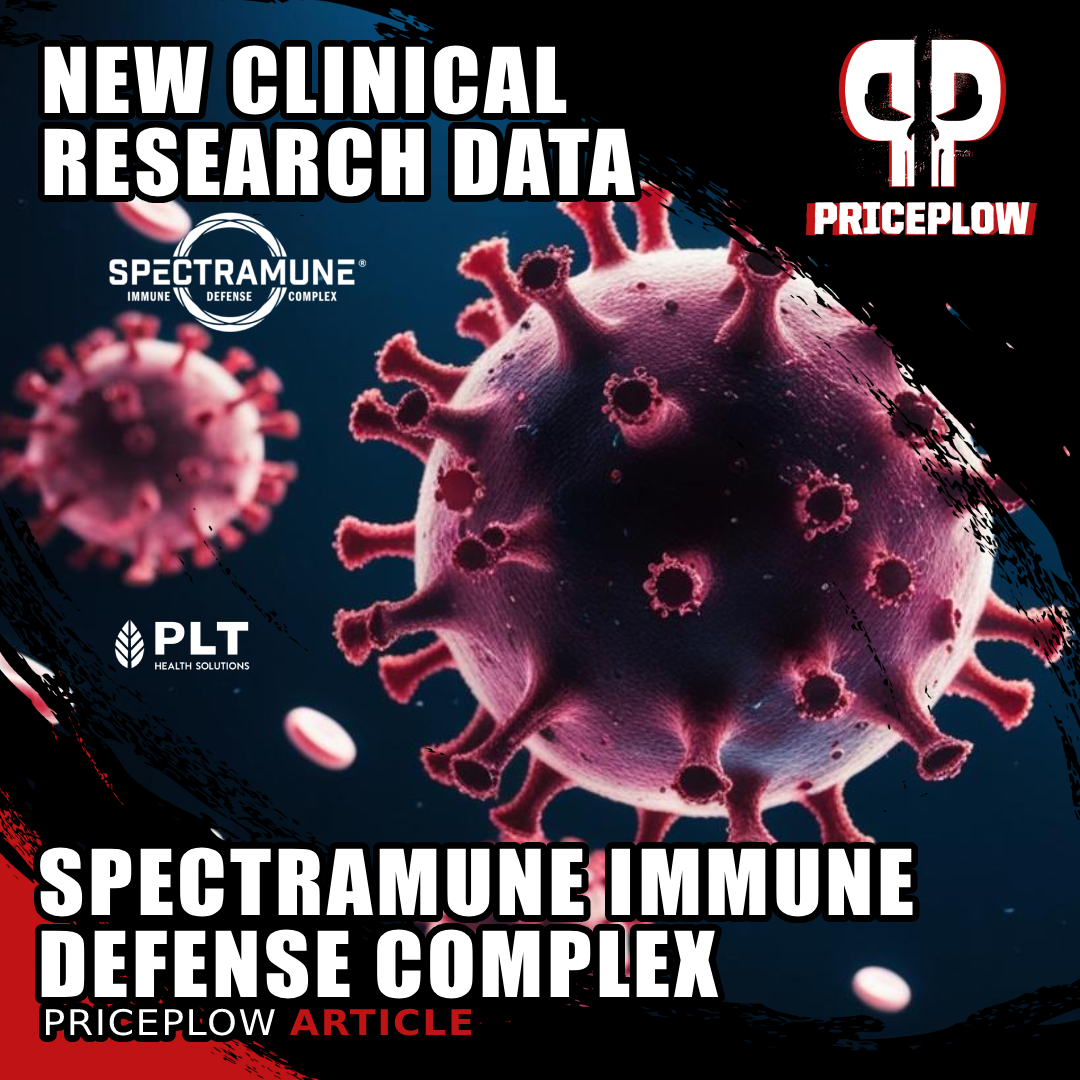
New clinical study shows Spectramune™ Immune Defense Complex delivers real results: 23% fewer respiratory infections and 30% less severe symptoms. This ashwagandha + haritaki blend now has three clinical trials proving immune support benefits.
Spectramune Delivers Real-World Immune Benefits: 23% Fewer Infections, 30% Less Severe Symptoms
The latest clinical investigation brings a breakthrough in botanical immune support research. In a 12-week randomized, double-blind, placebo-controlled study of 120 healthy adults, researchers demonstrated that Spectramune supplementation led to 23% fewer respiratory illness episodes and 30% less severe symptoms compared to placebo.[1]
These impressive results build upon two previous clinical studies, including a successful pilot published in 2024,[2] creating a robust body of evidence for this synergistic combination of ashwagandha (Withania somnifera) and haritaki (Terminalia chebula). The research validates improvements in both innate and adaptive immunity, with the latest study proving these biological changes translate into meaningful protection against seasonal respiratory challenges.
These findings also demonstrate dose-dependent benefits, with both 250 mg and 500 mg daily doses showing significant symptom reduction, while the higher dose provided additional protection against infection occurrence. This gives both formulators and consumers flexibility in targeting their specific immune support goals.
Sign up for our PLT Health Solutions and Spectramune alerts to stay informed about this developing story, then continue reading as we dive deep into what makes this ingredient unique in the immune support category, as well as the 2025 study.
Subscribe to PricePlow's Newsletter and Alerts on These Topics
What is Spectramune?
PLT Health Solutions' Spectramune® Immune Defense Complex represents a breakthrough in botanical immune support, combining two powerful herbs in a unique, patented formulation. Spectramune is a synergistic blend of ashwagandha (Withania somnifera) and haritaki (Terminalia chebula).
Development Through Advanced Screening
The development of Spectramune wasn't a matter of chance. PLT Health Solutions' innovation partner Laila Nutraceuticals conducted systematic testing of 40 different plants known to possess immune-modulating properties. Through this screening process, researchers found the optimal combination of standardized ashwagandha and haritaki extracts, which demonstrated superior immune support compared to other botanical combinations.
Standardization and Quality
The ingredient is standardized to contain specific levels of bioactive compounds from both herbs:
- Zinc salts of chebulinic acid and chebulagic acid, from Terminalia chebula, providing ~2 mg zinc per 500 mg dose of Spectramune
- Withanolide glycosides from Withania somnifera
This standardization ensures consistent potency and reliable immune support benefits across different supplement formulations. We'll cover both of these plants in detail in this article.
Synergistic Effects
What makes Spectramune unique is the synergistic relationship between these two core components. While both ashwagandha and haritaki independently demonstrate immune-modulating properties, their combination creates enhanced effects on both innate and adaptive immunity.
The formula is designed to be mild-tasting and 70-80% water-soluble, making it versatile for various supplement formats, from tablets and capsules to functional foods and beverages.
Let's dive a bit deeper into these two components:
The Components of Spectramune
Spectramune combines two powerful herbal extracts - ashwagandha and haritaki -- to target immune system support:
-
Withania somnifera (Ashwagandha)
Ashwagandha holds a revered position in Ayurvedic medicine, where it's classified as a "Rasayana" - a category of herbs that promote longevity, vitality, and overall well-being.[3]
Beyond immune support, ashwagandha demonstrates impressive versatility as an adaptogenic herb. This diagram showcases how the botanical component in Spectramune addresses multiple health concerns through its ability to modulate inflammation responses, support memory function, and provide overall systemic protection through its bioactive compounds.[4]
Traditional Uses & Modern Research
This adaptogenic herb has been used for over 3,000 years, and most know that it's traditionally prescribed to strengthen the nervous system and provide stress relief through its ability to control cortisol -- but it also supports immune function![5]
Key Bioactive Compounds
The immune-boosting properties of ashwagandha stem from its rich profile of bioactive compounds. The root and leaf extracts contain several key components that contribute to its immunomodulatory effects:
Withanolides, including withaferin A and withanolide A, serve as the primary active compounds responsible for immune system modulation.[5] These compounds work alongside other beneficial constituents such as alkaloids, glycowithanolides, and sitoindosides to support healthy immune function.[3]
This image displays the two botanical components that form Spectramune's patented 1:1 blend. The standardized extracts from ashwagandha roots and haritaki fruits provide consistent levels of immune-enhancing compounds including withanolides, chebulagic acid, and chebulinic acid, plus beneficial zinc.
In Spectramune's formulation, the ashwagandha extract is standardized to specific levels of withanolide glycosides, the primary bioactive constituents of Ashwagandha, ensuring consistent potency and reliable immune support benefits in every dose.
Ashwagandha’s Immunomodulatory Effects
Research has demonstrated that this traditional herb provides broad-spectrum immune support, helping to regulate and optimize various components of both innate and adaptive immunity.[3,4]
When taken as a supplement, ashwagandha helps enhance several key markers of immune function. It can increase important immune cells like T cells, B cells, and natural killer (NK) cells, which are critical for defending against various threats to the immune system.[6,7]
This detailed illustration reveals how ashwagandha upregulates beneficial immune responses. The herb activates multiple protection mechanisms, including increased T-cell function, enhanced natural killer cell activity, and improved antibody production—all critical factors in Spectramune's comprehensive immune defense capabilities.[4]
Beyond cellular immunity, the herb also supports the production of antibodies and other immune proteins that help protect the body. It's been shown to enhance levels of immunoglobulins like IgG and IgM, which play essential roles in identifying and neutralizing potential threats.[8]
The best part is ashwagandha's ability to help modulate the immune system without overstimulating it. This balanced approach to immune support helps explain why the herb has been used successfully for thousands of years in traditional medicine systems. We'll explore the specific mechanisms behind these effects in more detail in the mechanisms section below.
-
Terminalia chebula (Haritaki)
The second component of Spectramune comes from the dried fruits of Terminalia chebula, a tree that's long been considered one of the most important medicinal plants in traditional Ayurvedic medicine.[9]
The botanical source of haritaki, showing its distinctive flowers and fruit development stages. These fruits contain the rich concentration of bioactive compounds like chebulinic and chebulagic acids that, when combined with ashwagandha in Spectramune, create synergistic immune support benefits.[10]
Traditional Uses & Modern Research
Known as "Haritaki" in Sanskrit and "Chebulic Myrobalan" in English, T. chebula has been used for thousands of years across South Asian countries to support digestive health, immune function, and overall vitality.[11]
This comprehensive flow diagram illustrates the sophisticated process of transforming Terminalia chebula from raw plant material into a clinically-validated ingredient. The process involves multiple scientific validation methods including extraction, compound identification, and rigorous testing, ensuring Spectramune delivers reliable immune support benefits.[10]
As with ashwagandha, modern research has validated many of these traditional applications, demonstrating that T. chebula extracts possess antioxidant, antimicrobial, and immune-supporting properties.[12,13]
The molecular structures of key immune-supporting compounds found in Terminalia chebula, including chebulinic acid and chebulagic acid. These complex bioactive molecules are standardized in Spectramune to ensure consistent potency and are responsible for many of the ingredient's immune-enhancing properties.[10]
Key Bioactive Compounds
The immune-supporting effects of T. chebula are attributed to its rich profile of bioactive compounds, including:[10]
- Tannins (30-40%) such as chebulinic acid, chebulagic acid, and gallic acid
- Flavonoids like luteolin, rutin, and quercetin
- Various other phytochemicals including anthraquinones and polysaccharides
Immunomodulatory Effects
Research has shown that T. chebula helps support healthy immune function through multiple pathways. It can stimulate immune cell activity while also helping to maintain balanced inflammatory responses.[14]
The extract shows great promise in supporting respiratory health, with studies demonstrating its ability to help maintain healthy immune responses during seasonal challenges.[15]
We'll explore the specific cellular and molecular mechanisms behind these immune-supporting effects in more detail in the mechanisms section below.
Before diving into Spectramune's own research, we should first understand the immune system itself:
Understanding the Immune System
The immune system's complex network of cells, tissues, and organs work together to defend the body against threats while maintaining normal health and function.[16]
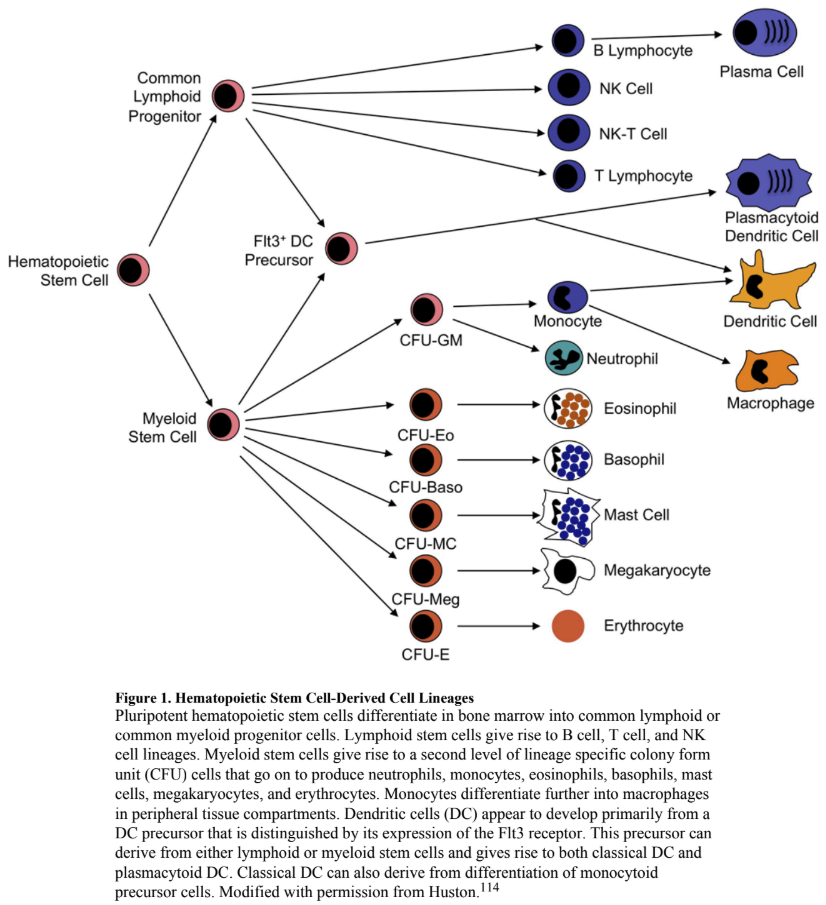
This detailed flow chart illustrates how immune cells develop from common stem cell precursors. Spectramune's clinical research shows it increases several of these key immune defenders, including T lymphocytes, B lymphocytes that produce antibodies, and natural killer cells—all essential components of a robust immune defense system.[16]
Two-Part Defense System
Our immune system operates through two complementary branches - innate and adaptive immunity. While they work together seamlessly, each plays a distinct role in protecting our health.
- The innate immune system acts as our body's first line of defense, responding quickly but non-specifically to potential threats. This system includes physical barriers like skin and mucous membranes, as well as specialized cells like neutrophils and natural killer (NK) cells that can rapidly identify and eliminate harmful substances.[16]
- The adaptive immune system, while slower to respond, provides targeted defense and creates immunological memory. This sophisticated system involves T cells and B cells that can recognize specific threats and mount increasingly effective responses with each exposure.[3]
Understanding Immunomodulation
Immunomodulation refers to any process that adjusts immune system activity - either enhancing or suppressing it as needed. This balance is crucial because both overactive and underactive immune responses can lead to health issues.[4]
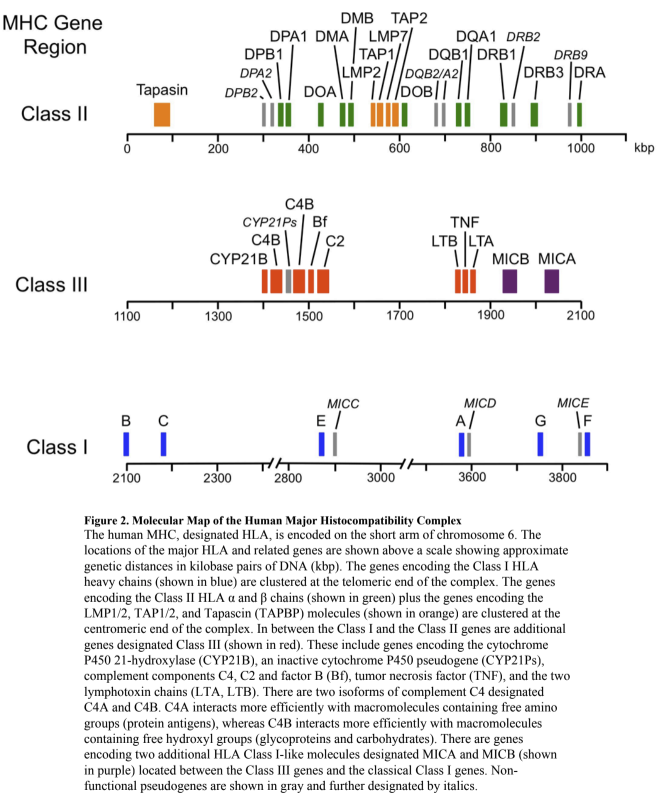
The molecular structure of the Major Histocompatibility Complex, which contains genes essential for proper immune cell communication. These genetic components play vital roles in how the immune system recognizes threats—a process that Spectramune's botanical compounds help optimize through balanced immune modulation.[16]
Natural immunomodulators, like those found in Spectramune's ingredients, can help regulate immune function without overstimulating it. This balanced approach helps maintain optimal immune responses while avoiding excessive inflammation.
Key Immune System Biomarkers
Several important biomarkers help us measure immune system function:[3]
- Immunoglobulins (IgA, IgG, IgM) - antibodies that identify and neutralize threats
- Cytokines (IL-2, IL-4, IFN-γ) - signaling proteins that coordinate immune responses
- Immune cells (T cells, B cells, NK cells) - specialized cells that protect against various threats
By monitoring these biomarkers in clinical studies, researchers can evaluate how effectively supplements like Spectramune support immune function. Changes in these markers can indicate improvements in both innate and adaptive immunity, providing scientific evidence for immune support claims.
The Clinical Research on Spectramune
Let's head through the research in chronological order, with the new 2025 abstract coming third:
-
First Clinical Study: Healthy Subject Immunomodulation (Sadhupati 2024)
Published in 2024, a 28-day randomized, double-blind, placebo-controlled trial evaluated Spectramune (LN20189) in 40 healthy adults aged 35-60 years old:[2]
Study Design & Methods
Participants received either 500 mg of Spectramune or placebo daily. The study measured multiple immune markers including T-cells (CD3+, CD4+, CD8+), natural killer (NK) cells, serum interferon-gamma (IFN-γ), immunoglobulin G (IgG), and used an Immune Function Questionnaire (IFQ) to assess overall immune status.[2]
This clinical flowchart outlines how researchers conducted Spectramune's initial human trial. The rigorous methodology included randomizing 40 participants between supplement and placebo groups, then measuring multiple immune biomarkers including T-cells, NK cells, and immune-signaling compounds that demonstrate the ingredient's effectiveness.[2]
Results: Numerous Improvements
After 28 days of supplementation, Spectramune demonstrated several significant improvements compared to both baseline and placebo:[2]
- Total T-cells (CD3+) increased by 9.32% from baseline
- CD4+ T-cells increased by 10.10% from baseline
- NK cells increased by 19.91% from baseline
- CD4:CD8 ratio improved by 17.43% from baseline and 16.36% vs. placebo
- Serum IFN-γ levels increased by 14.57% from baseline
- Total IgG levels increased by 27.09% from baseline
- IFQ scores decreased by 84.68%, indicating improved immune function
The supplement was well-tolerated, with only minor gastrointestinal events reported that resolved naturally without intervention.[2]
Key Findings
This initial human clinical study demonstrated that Spectramune can enhance both cellular and humoral immune responses in healthy adults. The improvements in T-cell populations, particularly the CD4:CD8 ratio, suggest enhanced cellular immune competence. The increases in NK cells and IFN-γ indicate strengthened innate immunity, while elevated IgG levels suggest improved humoral immune response.[2]
These graphs demonstrate how Spectramune maintains stable levels of key immune cell populations over time, supporting balanced immune function without overstimulation. This equilibrium is crucial for long-term immune support, avoiding the potential drawbacks of immune-stimulating ingredients that could disrupt normal immune homeostasis.
These results provide excellent preliminary clinical support for Spectramune's immunomodulatory effects, though the researchers note that longer-duration studies with larger sample sizes would be valuable to further validate these findings. The improvements across multiple immune markers, combined with the excellent safety profile, suggest Spectramune may be an effective option for supporting healthy immune function.[2]
-
COVID-19 Clinical Study Results (Unpublished)
A randomized, double-blind, placebo-controlled parallel study assessed how Spectramune impacted patients diagnosed with mild to moderate COVID-19.[17]
The trial demonstrated impressive results for COVID-19 recovery time. Subjects taking Spectramune recovered an average of 6.46 to 8.27 days earlier than the placebo group.[17]
On the inflammation front, Spectramune supplementation led to significant reductions in key inflammatory markers, measured through decreased serum levels of IL-6 and TNF-α compared to the control group.
Those taking Spectramune also had significantly improved perceived immune function, compared to the standard therapy alone.[17]
-
New (Third) Clinical Study: Real-World Upper Respiratory Benefits (2025)
The most recent clinical investigation of Spectramune is a major step forward in validating the ingredient's real-world immune support benefits. This randomized, double-blind, placebo-controlled study demonstrated measurable reductions in both the frequency and severity of upper respiratory tract infections in healthy adults.[1]
This detailed overview illustrates the rigorous methodology of Spectramune's latest clinical investigation, tracking 120 healthy adults across 12 weeks with multiple assessment points. The study measured concrete endpoints including respiratory symptom severity and a comprehensive panel of immune biomarkers, providing strong scientific evidence for the ingredient's effectiveness.
Study Design & Participants
The 12-week study included 120 healthy men and women aged 30-60 with BMIs between 22-29.9 kg/m² who reported self-perceived poor immune status. Participants were randomly assigned to one of three groups:[1]
- 250 mg Spectramune (LN-250)
- 500 mg Spectramune (LN-500), or
- Placebo
The study used validated assessment tools including the Wisconsin Upper Respiratory Symptom Survey (WURSS-24) for tracking infection symptoms and the Psychological General Well-being Index (PGWBI) for measuring quality of life outcomes. Participants logged symptoms daily throughout the 12-week period, providing comprehensive real-world data on immune health outcomes.
23% Fewer Respiratory Illness Episodes with 500 mg Dose
The results demonstrated clear dose-dependent benefits for upper respiratory health. Subjects taking 500 mg of Spectramune experienced significantly fewer upper respiratory tract infections compared to placebo, while both the 250 mg and 500 mg groups showed improvements in other measures.[1]
This detailed results summary showcases the significant findings from PLT Health's newest Spectramune study. The graphs demonstrate clear improvements in respiratory illness incidence, symptom severity, quality of life measures, and key immune biomarkers including white blood cells, natural killer cells, and immunoglobulins.
Only the higher 500 mg dose showed a statistically significant reduction in infection count, suggesting this may represent an optimal dose for maximum protective benefits.
30% Less Severe Symptoms at Both Doses
Also impressive was the substantial decrease in symptom severity when infections did occur. Both the 250 mg and 500 mg Spectramune groups experienced significantly less severe symptoms compared to placebo across multiple categories.[1]
The symptom improvements were observed in three key areas:
- Nasal symptoms - including runny nose, congestion, and breathing difficulties
- Throat symptoms - covering sore throat, cough, and related discomfort
- Systemic symptoms - such as fatigue, headache, and body aches
This broad spectrum of symptom relief suggests Spectramune's benefits extend beyond just preventing infections to helping the body better manage respiratory challenges when they do occur.
Enhanced Quality of Life and Psychological Well-being
Beyond the direct immune benefits, the study revealed significant improvements in participants' overall well-being. Both Spectramune groups showed enhanced scores on the WURSS-24 Global, Symptom, and Quality of Life measures during infection periods.[1]
The psychological well-being improvements were evident as early as day 21 and continued throughout the 12-week study period. Participants taking Spectramune reported better psychological health and overall well-being compared to those taking placebo, suggesting the ingredient's benefits extend beyond just physical immune support.
This diagram illustrates Spectramune's multiple benefits revealed through clinical research, including 23% fewer sick days, 30% less severe symptoms, and improvements in both immune biomarkers and psychological wellbeing. The balanced action on both innate and adaptive immunity creates a comprehensive protective effect.
Comprehensive Biomarker Improvements
The study also validated previous research showing positive changes in key immune biomarkers. Several important markers improved with Spectramune supplementation compared to placebo:[1]
- Total white blood cell count increased - indicating enhanced immune surveillance and readiness
- Total immunoglobulin G (IgG) levels rose - suggesting improved antibody production for long-term immunity
- Total antioxidant capacity improved - providing better protection for immune cells during activation
- Interleukin-4 (IL-4) levels decreased - indicating a shift toward more balanced immune responses
These biomarker changes align with the clinical improvements, providing biological evidence for the observed reductions in infection frequency and severity.
These graphs demonstrate Spectramune's significant effects on immune function. The test group showed remarkable improvements in immune cell populations and cytokine levels compared to placebo, particularly in NK cells and interferon-gamma production – critical components for maintaining strong immune defenses against seasonal challenges.[3]
Safety and Tolerability
As with previous Spectramune studies, this research confirmed the ingredient's excellent safety profile. All hematology and clinical biochemistry measures remained within normal ranges throughout the 12-week supplementation period.[1]
Clinical Significance
This third clinical study represents a major advancement in Spectramune research by demonstrating clear, measurable benefits for real-world immune challenges. While previous studies showed promising biomarker improvements, this research shows that those biological changes translate into meaningful reductions in illness frequency and severity.
The findings support both dose options, with 250 mg providing symptom severity benefits and 500 mg offering additional protection against infection occurrence. This gives formulators and consumers flexibility in choosing the most appropriate dose based on their specific immune support goals.
Detailed Mechanisms: How Spectramune Works
We've covered the basics, but for those who want to understand more detailed mechanisms of how Spectramune works, this section gets a bit more scientific.
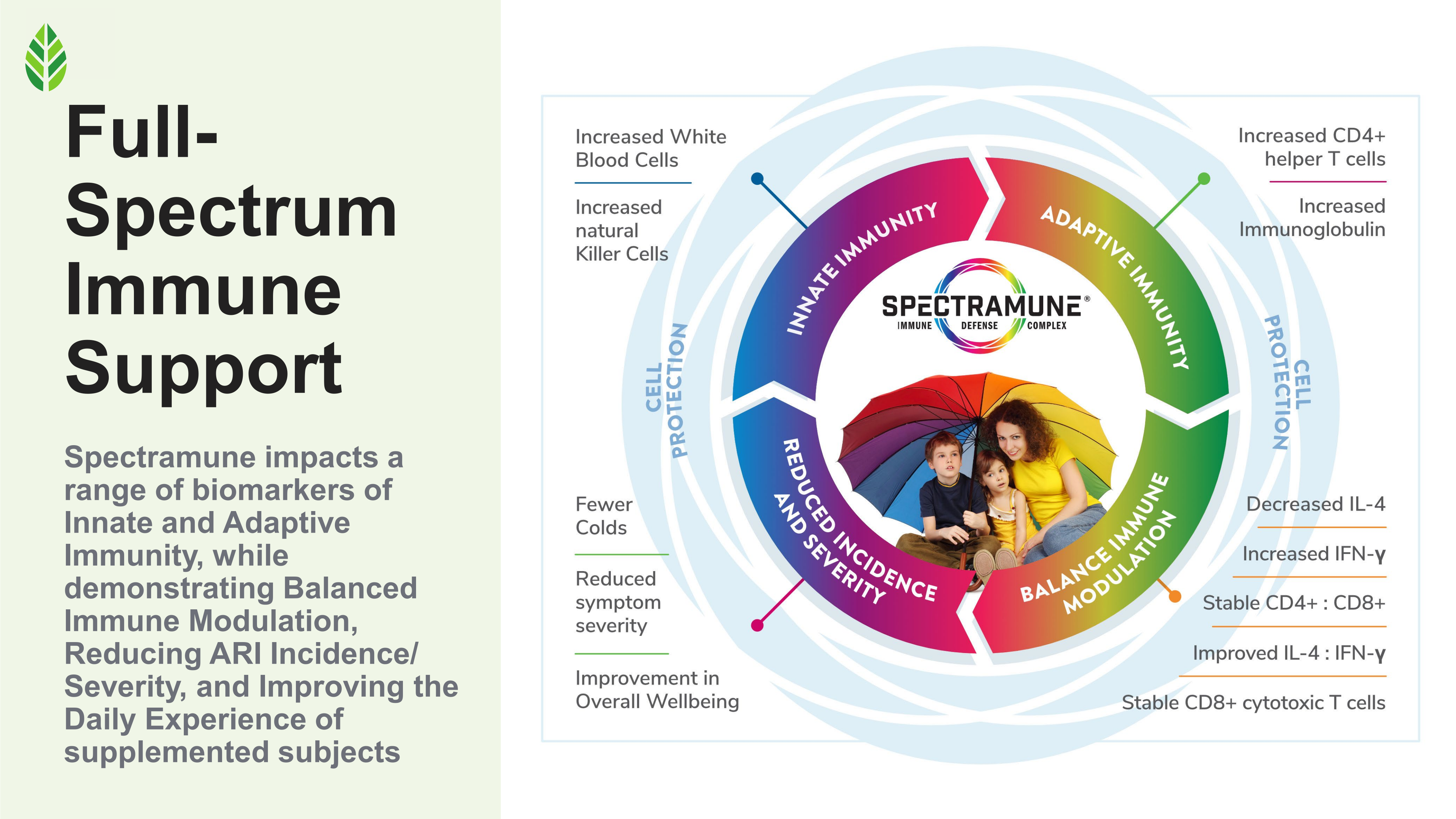
This vibrant illustration shows how Spectramune affects multiple aspects of immune function, creating a protective circle around immune health. The ingredient's balanced effects on immune cell populations, cytokines, and inflammation pathways help explain its clinical effectiveness in reducing illness episodes and symptom severity.
Recall our discussion of both major branches of the immune system (innate and adaptive) covered above. Spectrumune provides comprehensive support by modulating both the rapid-response innate immune system (through enhanced white blood cell and NK cell activity) as well as the targeted adaptive immune system (via improved T-cell and antibody responses).
What makes the ingredient unique is its ability to enhance these immune responses without overstimulating the system. By helping balance the Th1/Th2 responses,[2] it supports optimal immune function while avoiding excessive inflammatory reactions that could be counterproductive.[3,14]
Let's examine how each of Spectramune's components may contribute to these effects:
-
Ashwagandha (Withania somnifera)
Research demonstrates that ashwagandha provides powerful immunomodulatory effects through multiple pathways. Clinical studies show it enhances both cellular and humoral immunity by increasing the production and activity of key immune cells.[3,4]
The following immune markers are significantly enhanced with ashwagandha supplementation:[3]
- T-cell populations, including CD4+ and CD8+ cells
- Natural Killer (NK) cell activity
- Immunoglobulins IgG and IgM production
- Key cytokines like IFN-γ and IL-4
Modulating the NF-κB Signaling Cascade
One key pathway ashwagandha modulates is the NF-κB signaling cascade, which helps regulate inflammatory gene expression. Additionally, the component withaferin A seems to modulate ZAP70 kinase activity involved in T-cell function.[3,18]
The cortisol angle
Beyond direct immune cell modulation, ashwagandha's effects on stress hormones provide another layer of immune support. By helping to regulate cortisol levels,[19,20] it prevents stress-induced immune suppression that can leave us vulnerable to seasonal challenges.
-
Haritaki (Terminalia chebula)
Terminalia chebula stands out for its ability to enhance adaptive immunity while providing powerful antioxidant support. Clinical research shows it increases several key immune markers that help coordinate targeted immune responses.[12,13,21]
Enhanced Adaptive Immunity
The extract significantly improves immune cell ratios and function by:
- Optimizing CD4/CD8 T-cell ratios
- Boosting NK cell activity
- Increasing IFN-γ production
Antioxidant and Gut Health Support
Haritaki's rich polyphenol content provides antioxidant support that helps protect immune cells from oxidative stress.[9] This antioxidant activity, combined with its beneficial effects on gut health, creates a foundation for balanced immune function.[22]
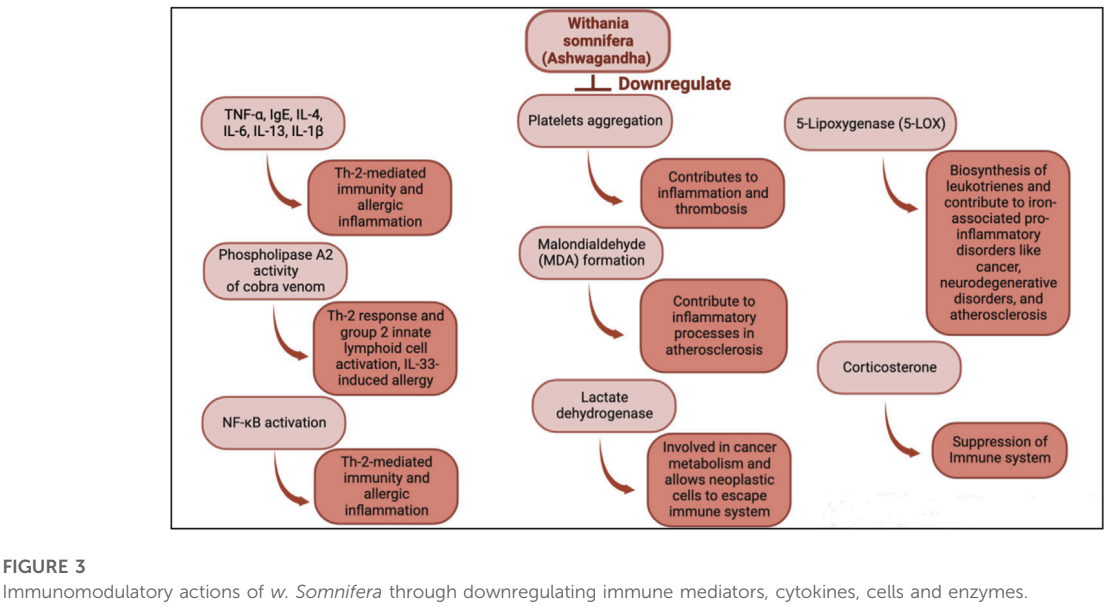
The dual action of ashwagandha is highlighted here, showing how it downregulates excessive inflammatory responses while enhancing protective immunity. This balancing effect helps explain why Spectramune supports immune function without over-stimulation, an important consideration for long-term immune supplement use.[4]
Dosing, Usage, & Applications
Understanding proper dosage and timing is crucial for getting the most out of Spectramune's immune-supporting benefits. The latest clinical research provides clear dose-response data, giving formulators and consumers evidence-based options for their specific immune support goals:
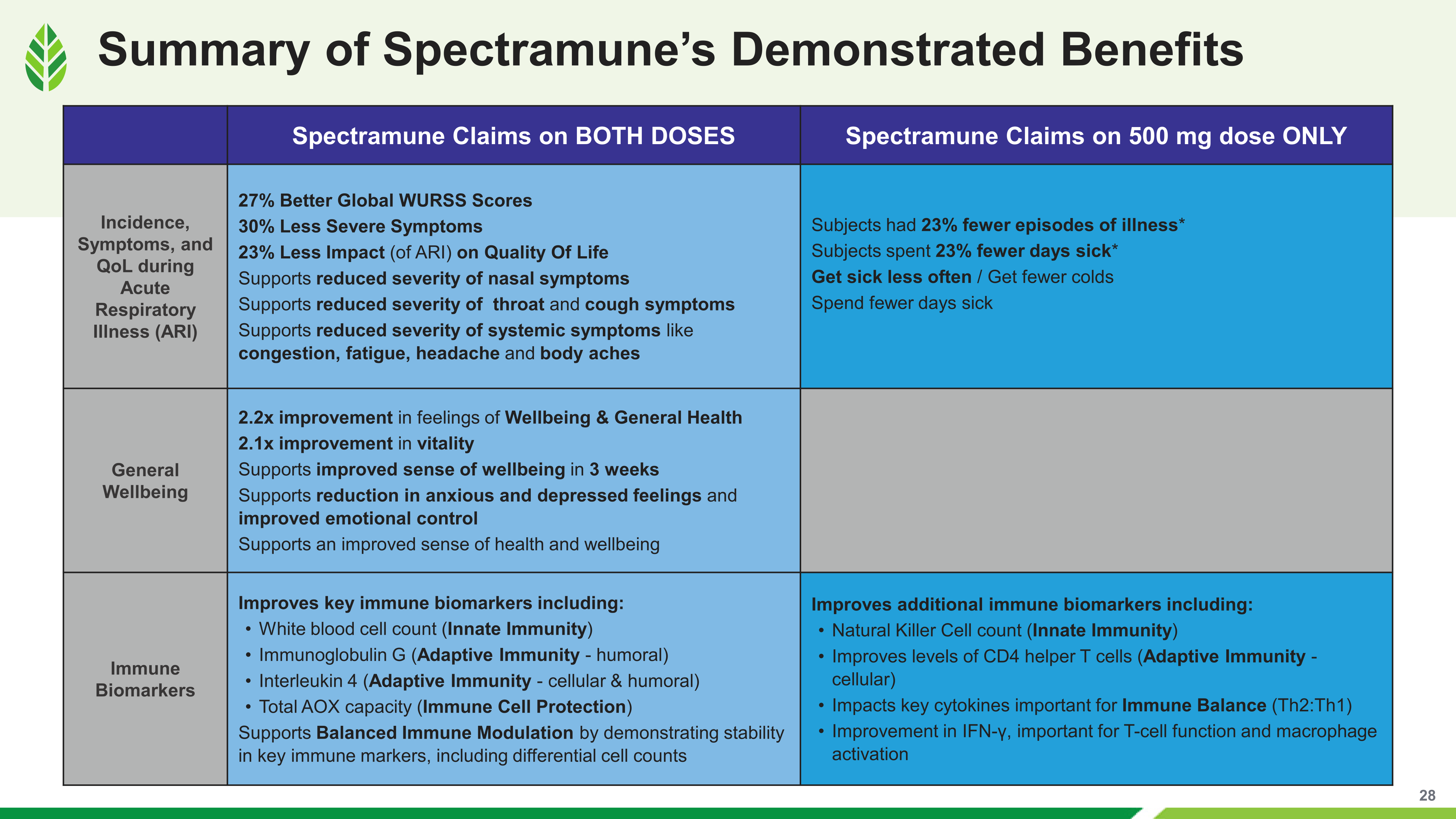
This comprehensive chart details Spectramune's proven effects at both 250mg and 500mg dosages. While both doses showed significant benefits for symptom reduction and psychological wellbeing, the 500mg dose provided additional advantages for illness prevention and enhanced more immune biomarkers in clinical testing.
Recommended Dosage: Clear Dose-Response Benefits
Clinical research on Spectramune has now validated two distinct dosage options with different benefit profiles:
250 mg per day - Symptom Severity Reduction
The lower dose has been shown to provide significant benefits for symptom management:[1]
- 30% reduction in symptom severity when respiratory infections occur
- Improved psychological well-being and quality of life measures
- Enhanced biomarkers including white blood cell count and total antioxidant capacity
- Excellent safety profile with no adverse events
500 mg per day - Maximum Protection
The higher dose provides all the benefits of the 250 mg dose plus additional protective effects:[1]
- 23% fewer respiratory illness episodes - the only dose to show infection prevention
- 23% fewer total sick days compared to placebo
- Enhanced immune biomarkers including NK cells, IgG levels, and improved T-cell ratios
- Validated across three separate clinical trials
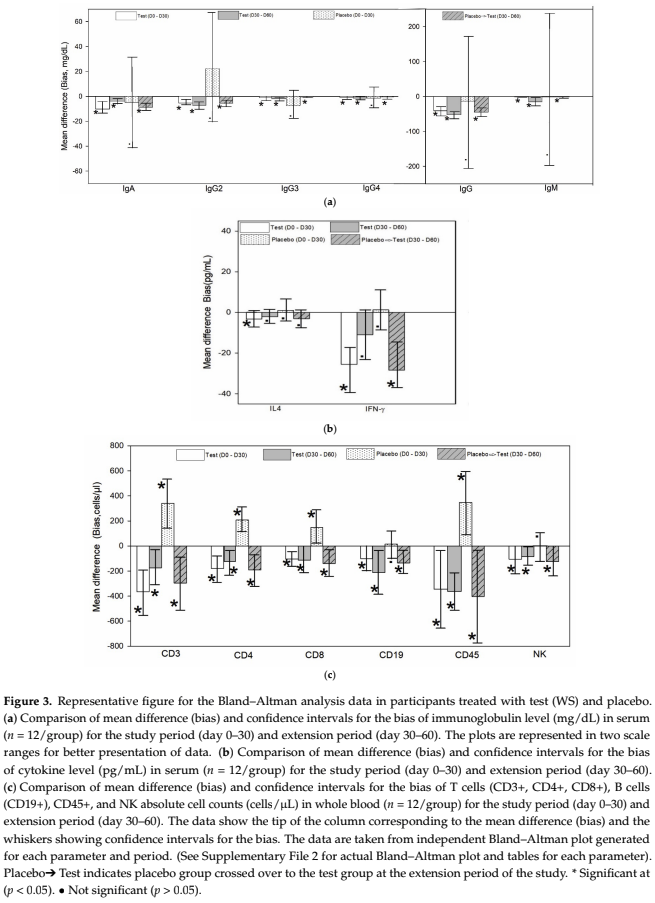
This detailed analysis compares immune parameters between treatment groups across both study phases. The graphs showcase Spectramune's sustained benefits on multiple immune markers, including immunoglobulins and T-cell populations, confirming that the botanical blend provides durable immune enhancement that continues even into the extension period.[3]
Dose Selection Guidelines
For General Immune Support: 250 mg daily provides meaningful symptom reduction and well-being benefits, making it suitable for everyday immune maintenance.
For Maximum Seasonal Protection: 500 mg daily offers the full spectrum of benefits, including actual reduction in infection frequency - ideal for those seeking maximum protection during challenging seasons or high-exposure periods.
For First-Time Users: Starting with 250 mg allows users to assess tolerance while still receiving clinically-proven benefits, with the option to increase to 500 mg if desired.
Timing Considerations
The clinical studies demonstrating Spectramune's effectiveness utilized daily supplementation over 12-week periods to support ongoing immune function. Benefits begin appearing within the first three weeks, making it ideal to start supplementation before seasonal challenges begin.[1]
For optimal results, consider beginning supplementation 4-6 weeks before anticipated seasonal immune challenges, as the research shows benefits build over time with continued use.
Target Demographics
Spectramune's benefits have been validated across a broad range of healthy adults. The clinical studies focused on participants aged 30-60, but the ingredient can be effective for any adult seeking:
- Immune system support during seasonal challenges
- Reduced severity of respiratory symptoms
- Combined immune and stress-management benefits
- Enhanced overall well-being and vitality
The ingredient is especially valuable for individuals with self-perceived poor immune status, as this population showed the most dramatic improvements in the latest clinical trial.[1]
Formulation & Manufacturing
PLT Health Solutions' innovation partner Laila Nutraceuticals employs a sophisticated extraction and manufacturing process to ensure Spectramune's consistent potency and quality. The process begins with carefully selected raw materials - specifically the roots and leaves of Withania somnifera and fruits of Terminalia chebula.
-
Extraction & Standardization
The extraction process uses proprietary methods to properly concentrate the bioactive compounds from both herbs. For the Terminalia chebula portion, zinc is incorporated during processing to help standardize the chebulinic and chebulagic acids, with a side benefits of providing supplemental zinc, which has immune-modulatory benefits of its own.[2]
The chromatogram reveals the unique fingerprint of Spectramune's standardized botanical blend. Key immune-supporting compounds from both ashwagandha and haritaki are clearly visible, including chebulagic acid, chebulinic acid, and various withanolides that contribute to its comprehensive immune defense properties.[2]
The final product is standardized to contain specific levels of key compounds:[2]
- At least 2.0% Chebulinic and Chebulagic acids
- At least 0.2% Total Withanolides
-
Manufacturing Benefits
One of Spectramune's key advantages for manufacturers is its versatility in different delivery formats. The ingredient is approximately 70-80% water-soluble and has a mild taste profile, making it suitable for various supplement forms including capsules, tablets, powders, and even functional beverages.[23]
The ingredient's mild taste profile and excellent solubility make it suitable for a wide range of supplement formats, from traditional capsules and tablets to powders and functional foods. This formulation flexibility gives manufacturers multiple options for incorporating Spectramune into consumer-friendly immune support products.
This formulation flexibility, combined with its standardized active compounds, positions Spectramune as an attractive option for brands looking to develop next-generation immune support products. The ingredient can serve as either a standalone immune support component or as part of a more comprehensive immune health formula.
Final Thoughts: Three Clinical Trials Establish Spectramune as a Game-Changer in Immune Support
The clinical research on Spectramune represents one of the most comprehensive immune support ingredient development programs in the botanical supplement industry. With three completed randomized, double-blind, placebo-controlled clinical trials, this unique combination of Withania somnifera and Terminalia chebula has established itself as a scientifically-validated solution for immune health.[1]
What sets Spectramune apart isn't just the volume of research, but the progression from biomarkers to real-world benefits:
- Study 1 demonstrated enhanced immune biomarkers and T-cell function in healthy adults[2]
- Study 2 showed accelerated COVID-19 recovery and reduced inflammatory markers[17]
- Study 3 proved these biological improvements translate into 23% fewer respiratory infections and 30% less severe symptoms in daily life[1]
This research trajectory - from immune system optimization to measurable health outcomes - provides the kind of evidence-based foundation that formulators and consumers demand in today's supplement market.
Clinical Validation Beyond Biomarkers
Spectramune's latest research delivers the real-world endpoints that matter most to consumers: fewer sick days, less severe symptoms, and improved quality of life during respiratory challenges. These practical benefits, combined with excellent safety profiles across all three studies, position Spectramune as a cornerstone ingredient for next-generation immune support formulations.
The dose-response data from the latest study provides additional formulation flexibility, with 250 mg delivering symptom severity benefits and 500 mg offering maximum protection including infection prevention.
The Future of Immune Support
As the supplement industry continues to evolve toward evidence-based formulations, ingredients like Spectramune -- backed by multiple human clinical trials with practical endpoints -- set the standard for immune support. The combination of traditional Ayurvedic wisdom with modern clinical validation creates a story that resonates with both scientifically-minded consumers and healthcare practitioners.
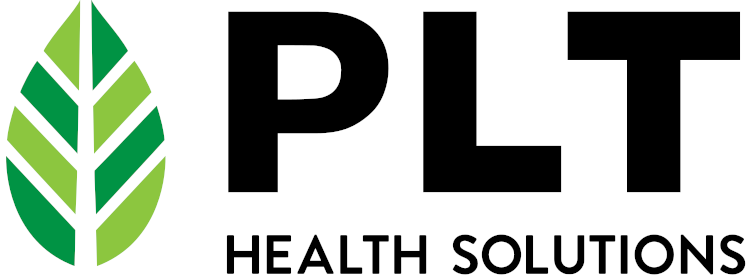
PLT Health Solutions: Growth Through Innovation
For brands looking to differentiate their immune support products with clinically-proven ingredients that deliver measurable benefits, Spectramune offers a unique opportunity to lead the market with science-backed innovation.
Stay informed about PLT Health Solutions' developments and future Spectramune research by signing up for our news alerts:
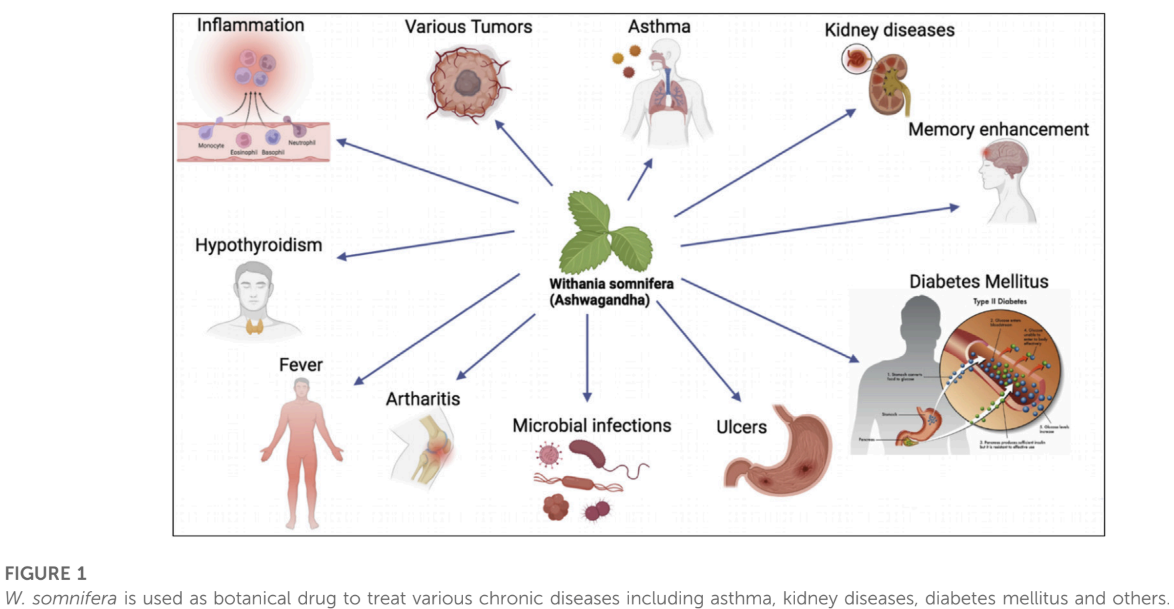
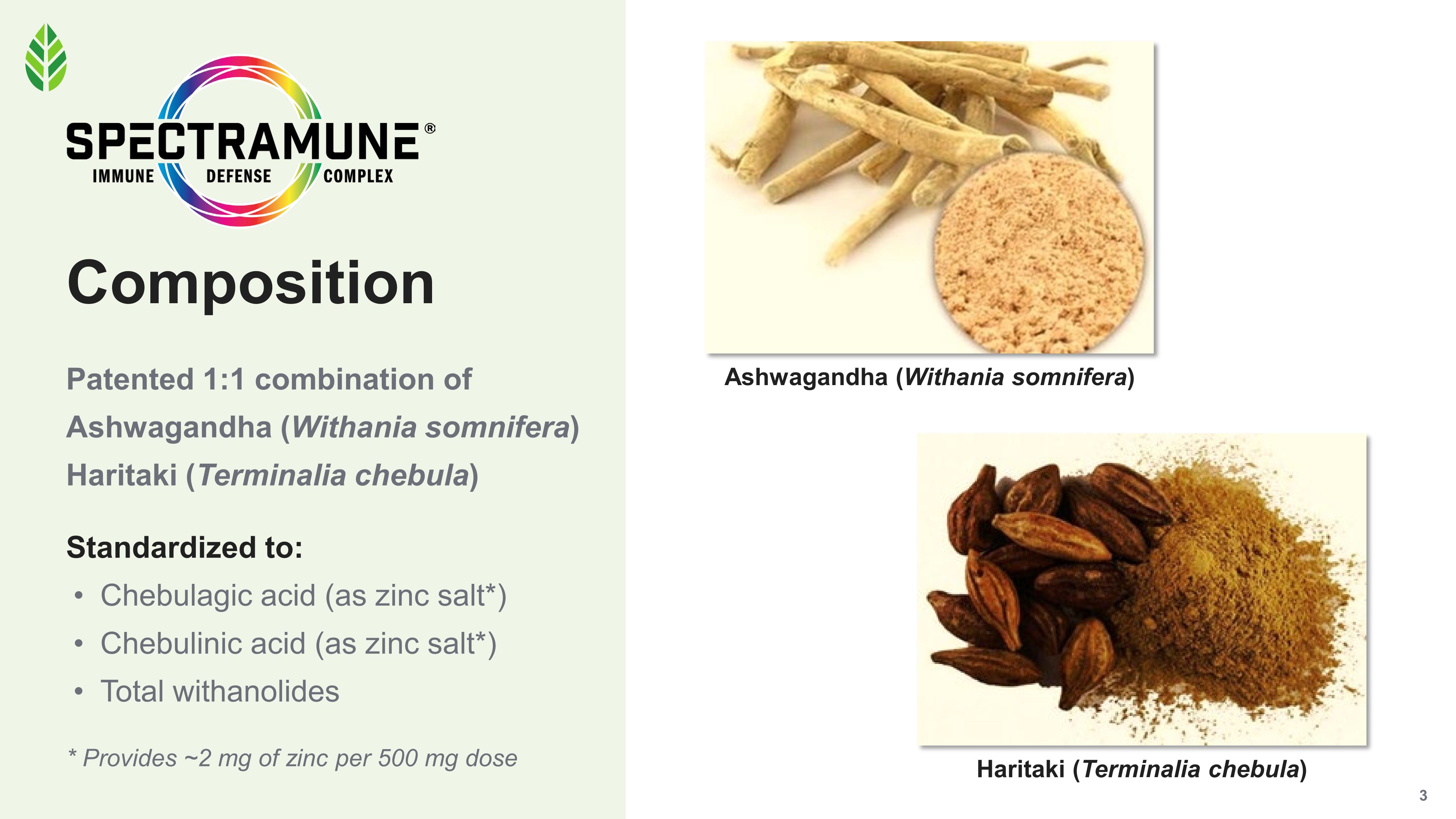
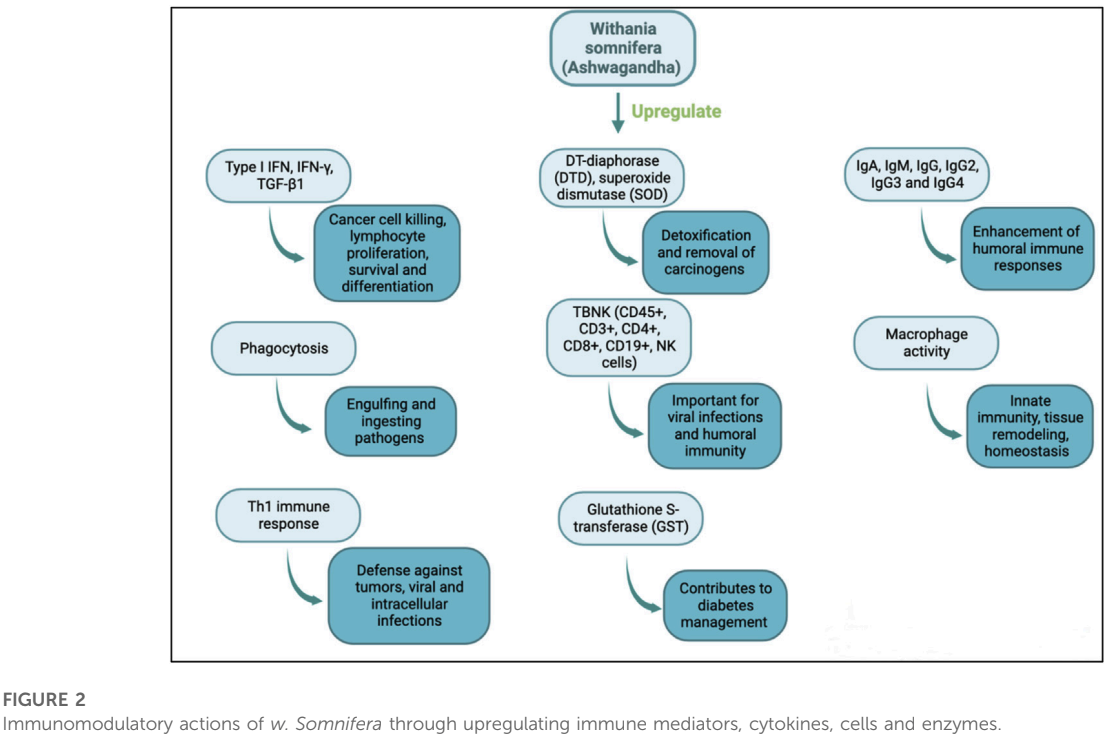
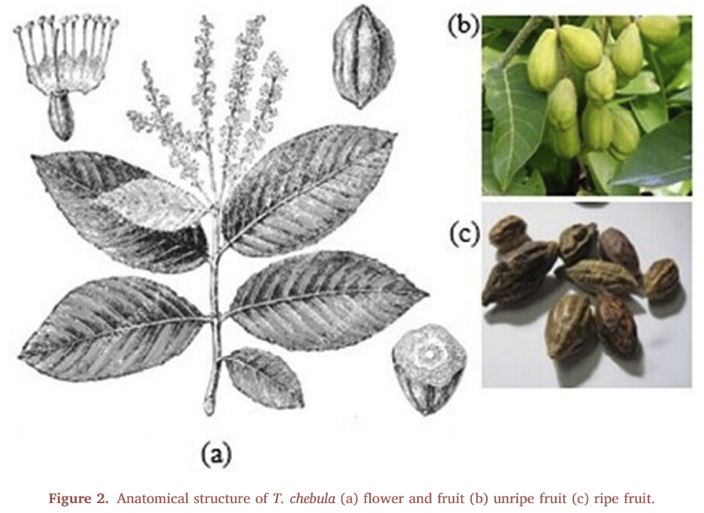
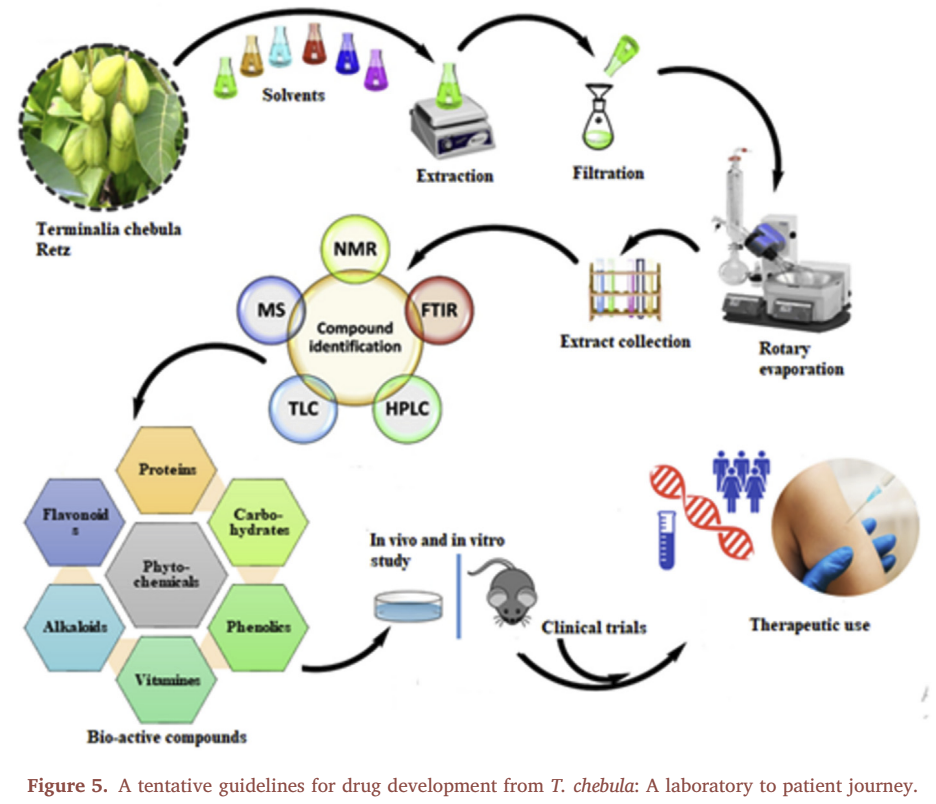
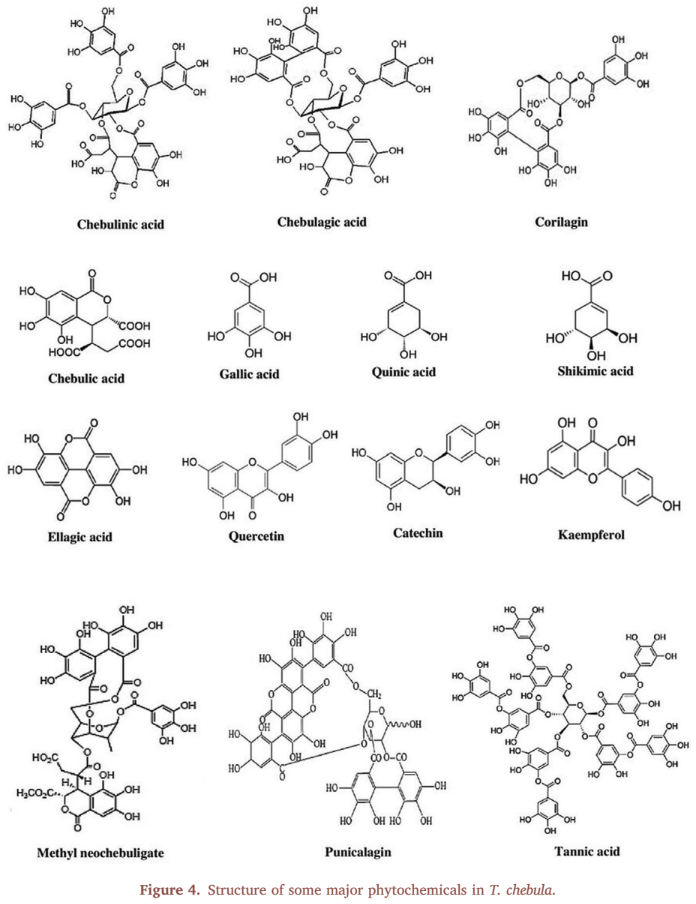
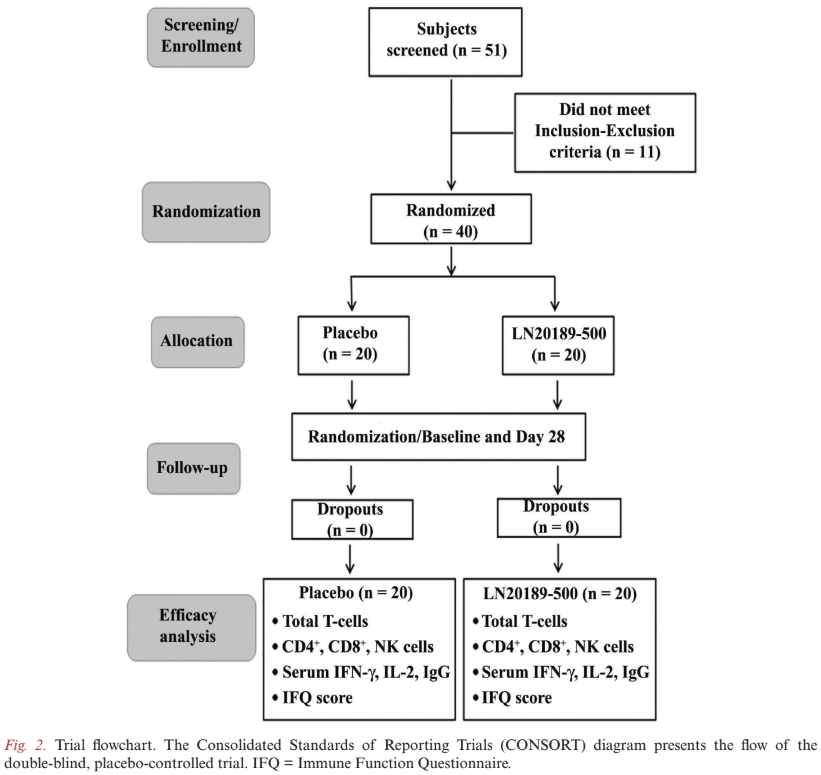
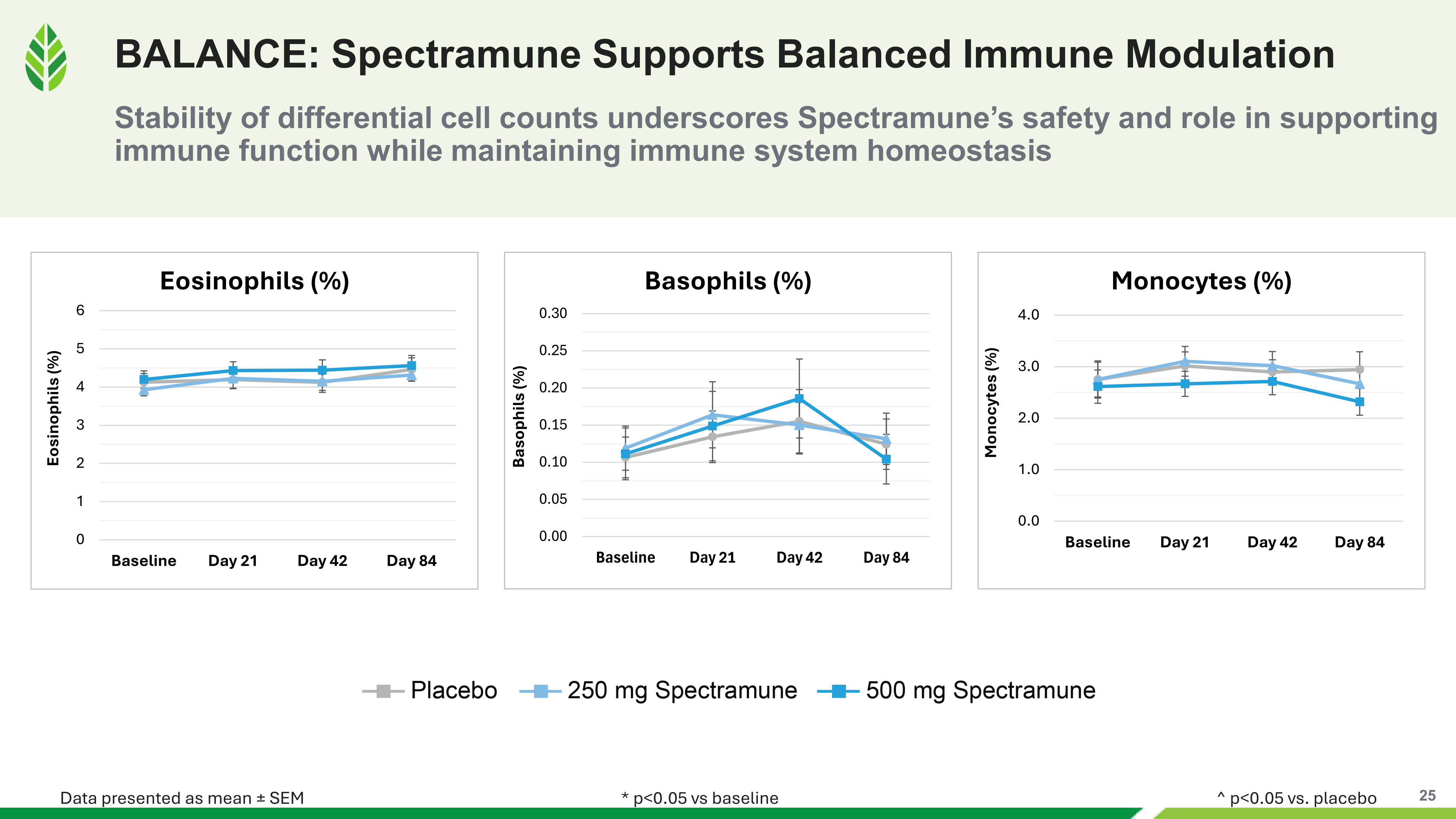
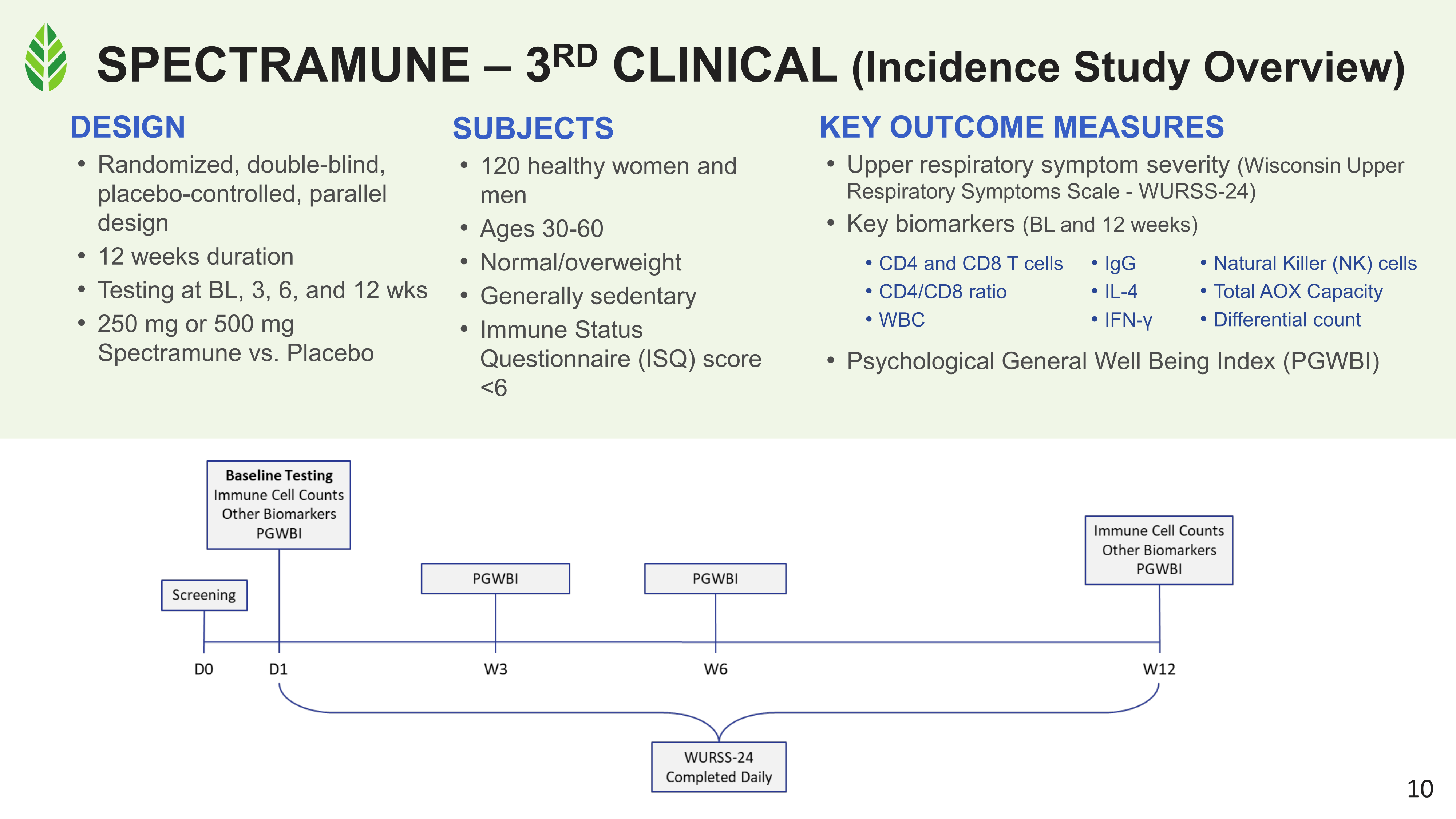
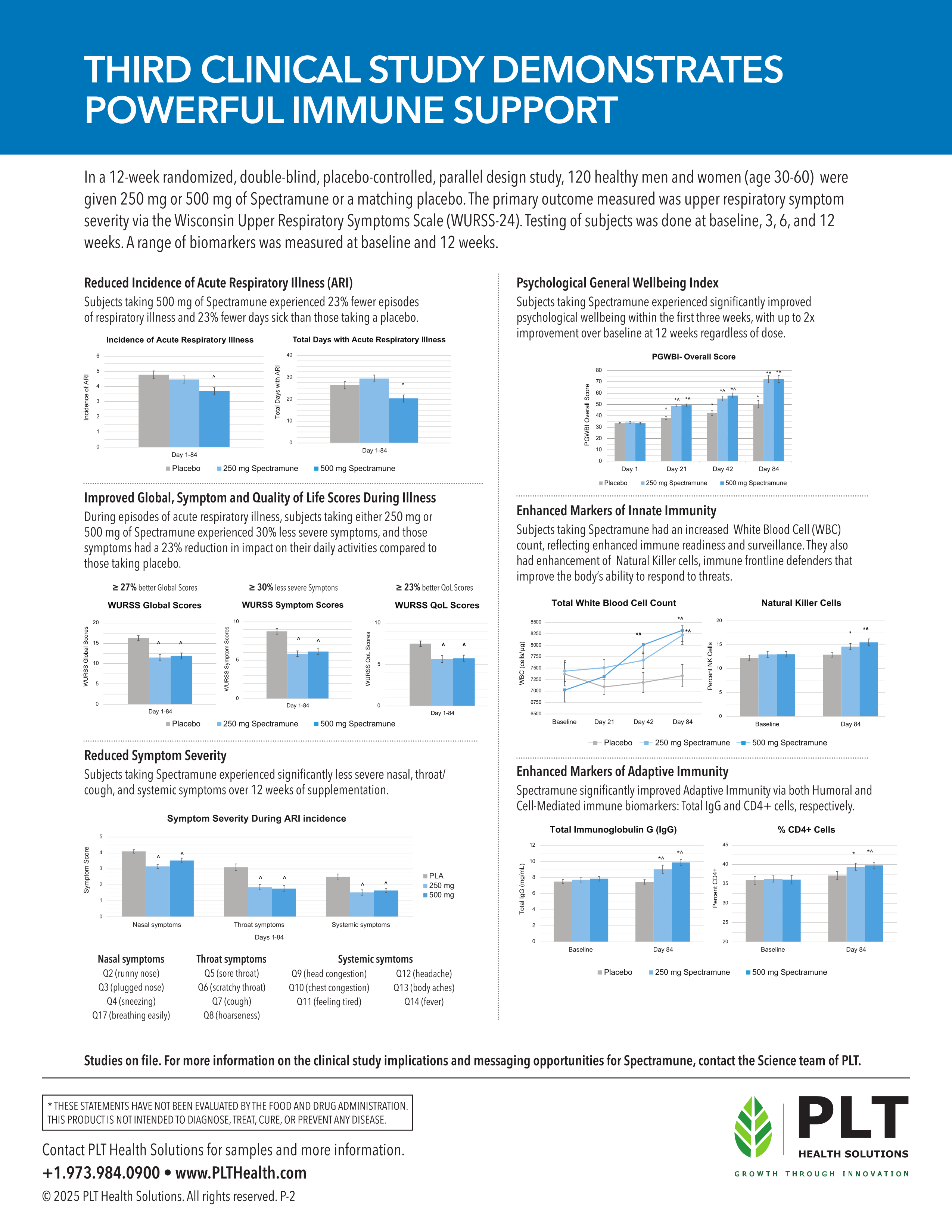
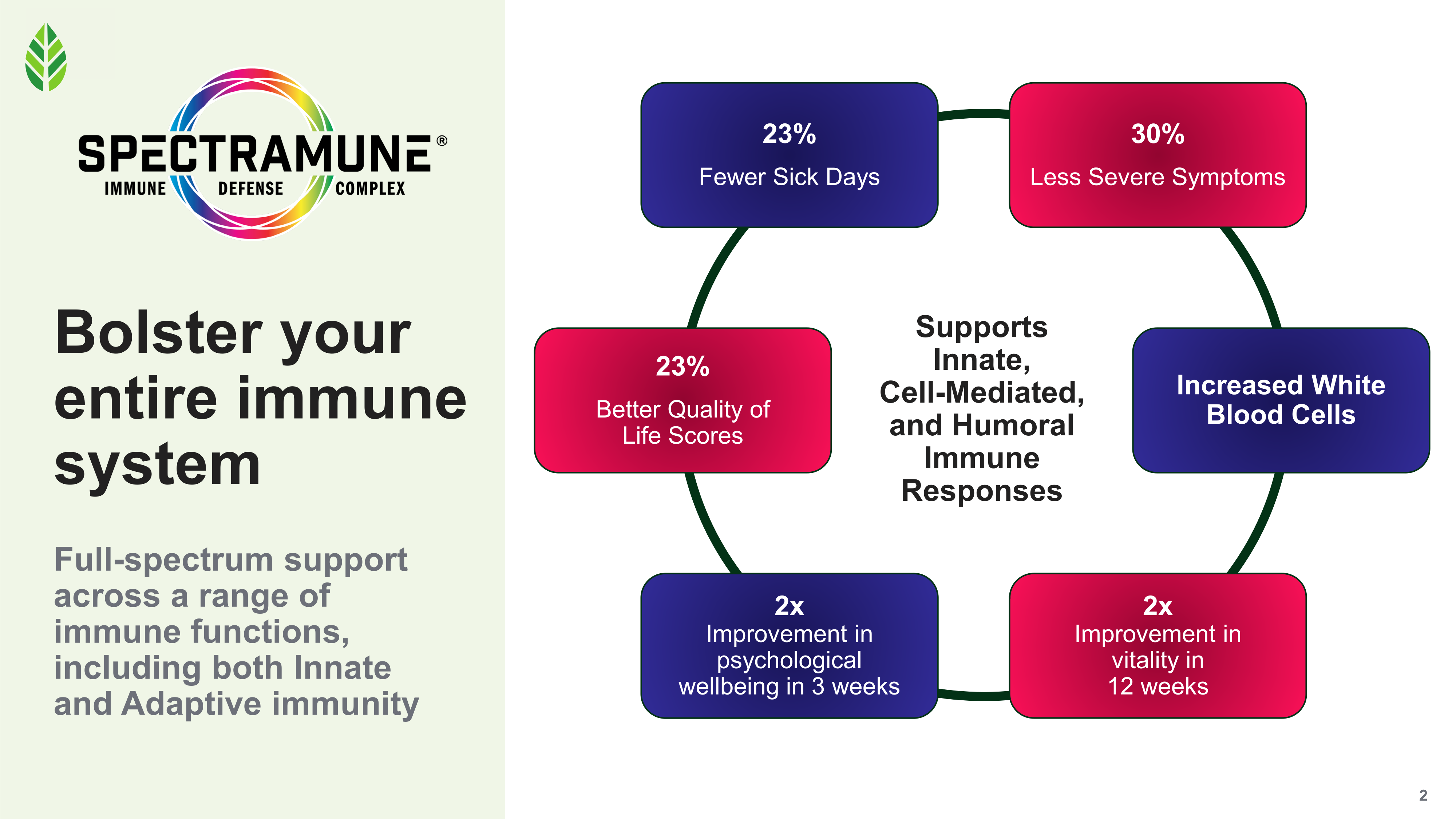
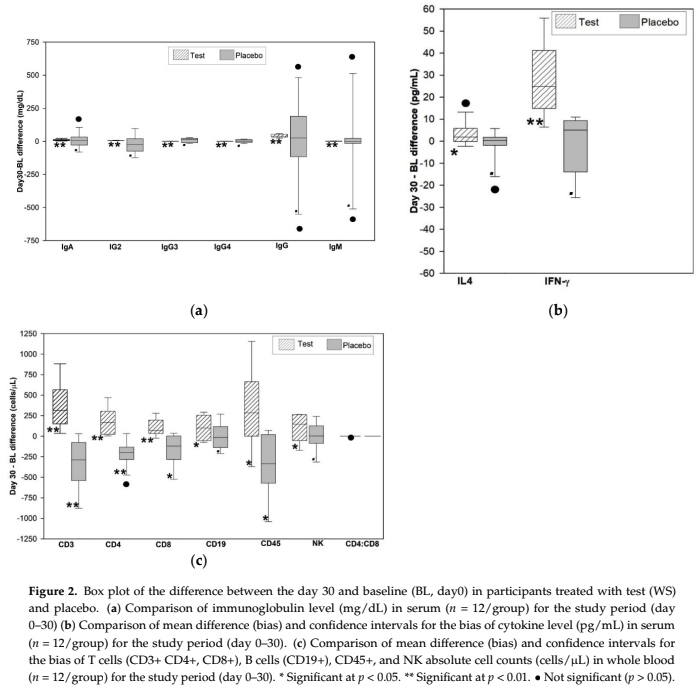
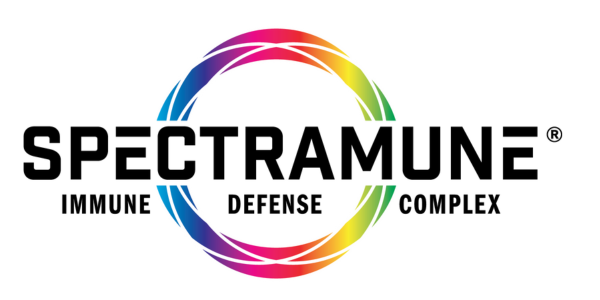

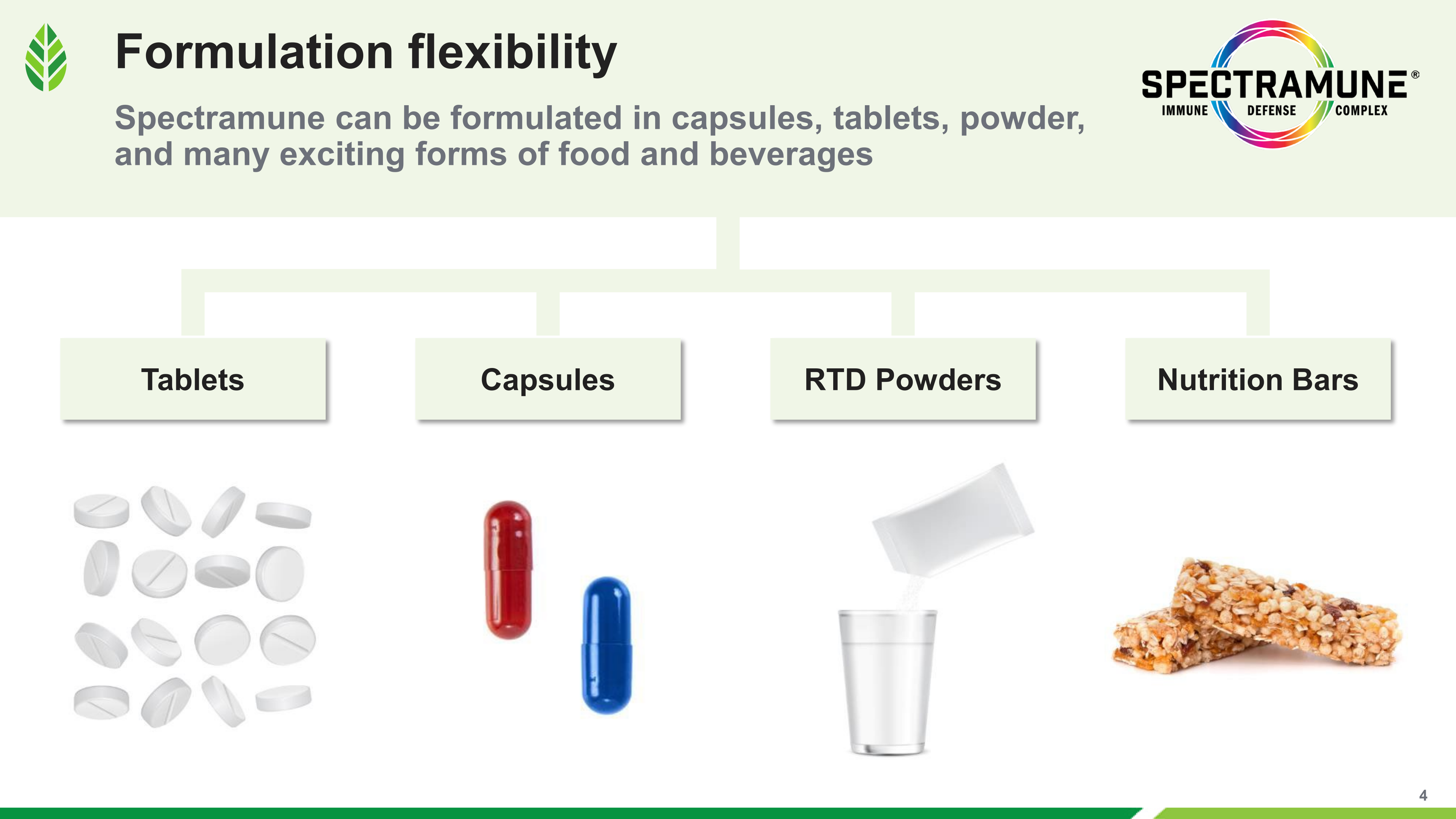
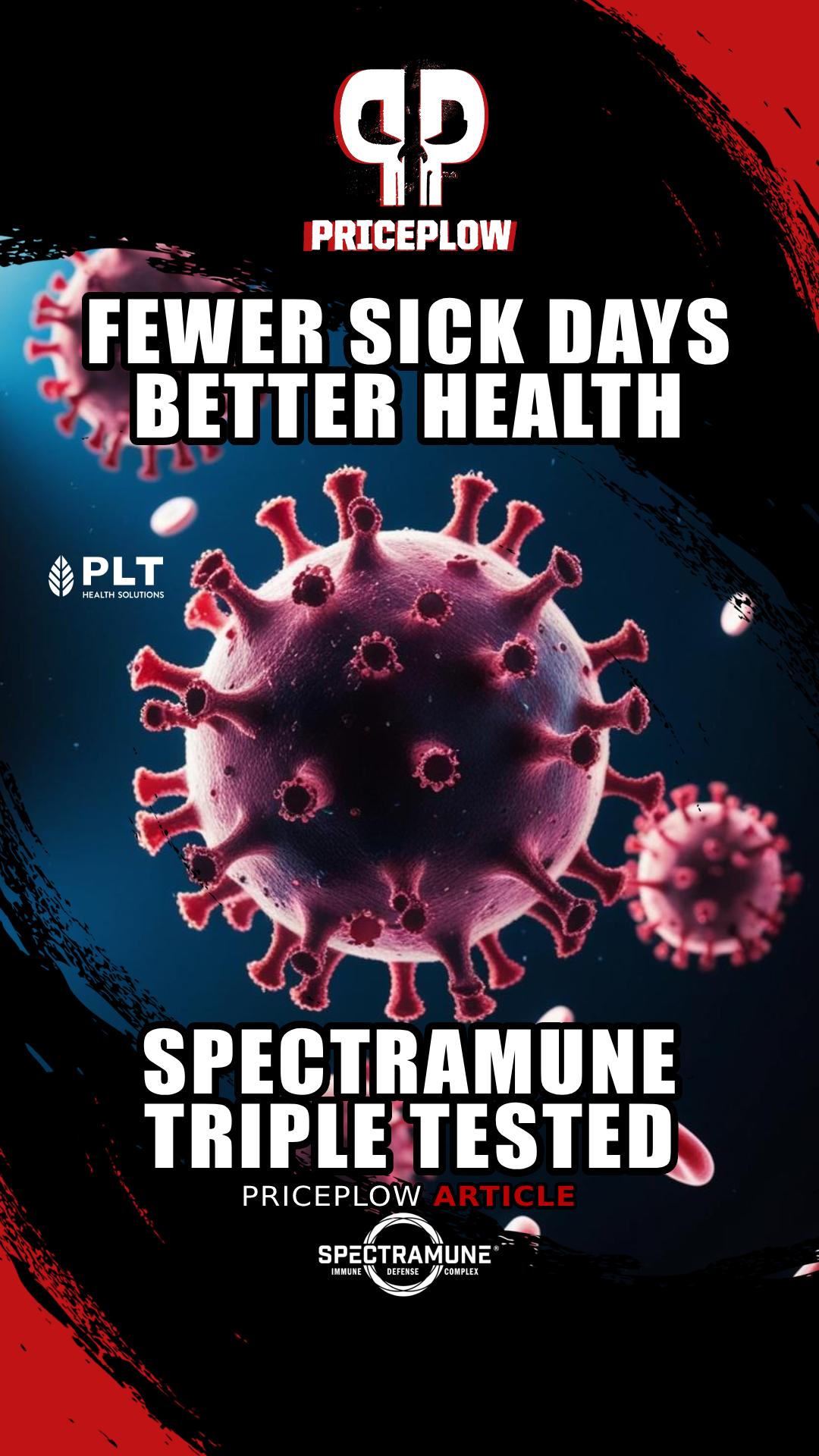


Comments and Discussion (Powered by the PricePlow Forum)